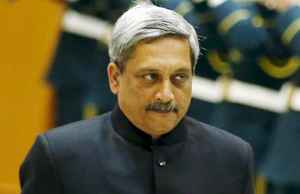New Delhi, May 26: Undeterred by the controversy over his earlier "terrorists have to be neutralised only through terrorists" remark, Defence Minister Manohar Parrikar has asserted that he will go to "any extent" to protect India and those who attack will be "paid back in the same coin".
Parrikar noted that his remarks evoked a sharp reaction only from one country and, without naming Pakistan, said the question was about his reaction on the terrorist camps in Pakistan-occupied-Kashmir supported by Pakistan. "So the response was based on that," he told media in an interview.
He further added that the word "neutralise" does not mean only killing but also making terrorists switch the sides and surrendering.
Underlining that his remark was generic and not against anyone in particular, Parrikar maintained that only a certain part of his remarks was picked up and highlighted.
"Basically, if I have to defend my country, I will go to any extent...Whatever is required to be done will be done. That is the basic motto which one should have.
"If someone harms my country, I have to take pro-active action....The army's basic purpose is that if anyone attacks the country, attack him back. Pay him back in the same coin," Parrikar asserted, underlining that one does not keep 13 lakh strong Army to "preach peace".
However, he clarified that "I have not said I am going to do covert operation. I did not talk about it. The person who asked me talked about covert operation. Not me." During a media event last week, Parrikar, in reply to a question, had said, "We have to neutralise terrorists through terrorists only. Why can't we do it? We should do it". The remarks generated sharp reaction from Pakistan which said it confirms apprehensions about India's involvement in terrorism.
"This statement only confirms Pakistan's apprehensions about India's involvement in terrorism in Pakistan. It must be the first time that a Minister of an elected government openly advocates use of terrorism in another country on the pretext of preventing terrorism from that country or its non-state actors," Sartaz Aziz, Adviser to Pakistan Prime Minister on Foreign Affairs, has said.
"It is my duty to go to any extent. It is my oath that I have taken that I will protect the constitution. Protecting constitution means protecting the country. So obviously, for protection of my country, certain issues have to be done. Giving interpretation to it, I will not give," Parrikar said.
The minister also said he is clear when he talks about neutralising. "The word neutralising does not mean killing all the time. Neutralising means a person surrendering, using someone against someone, it can be through peaceful means also. Neutralising means he comes on your side. That means intelligence," he said. Parrikar said he has directed the Army that if someone starts firing at them, "then kill him".
"I have told army that they should not hesitate. Don't lose your men like Col Rai who was such a brave soldier. I can't afford to lose such wonderful men," Parrikar said.
Col M N Rai was killed in Jammu and Kashmir in January by a terrorist who said he was surrendering after being encircled. He fatally shot Col Rai before being gunned down.
"My instructions are clear. Don't lose your personnel. Be careful about human rights, be careful about collateral damage because at times you are operating in a densely populated area. And though you may know that populated areas are also harbouring terrorists, civilians should not be harmed," he said.





Comments
Add new comment